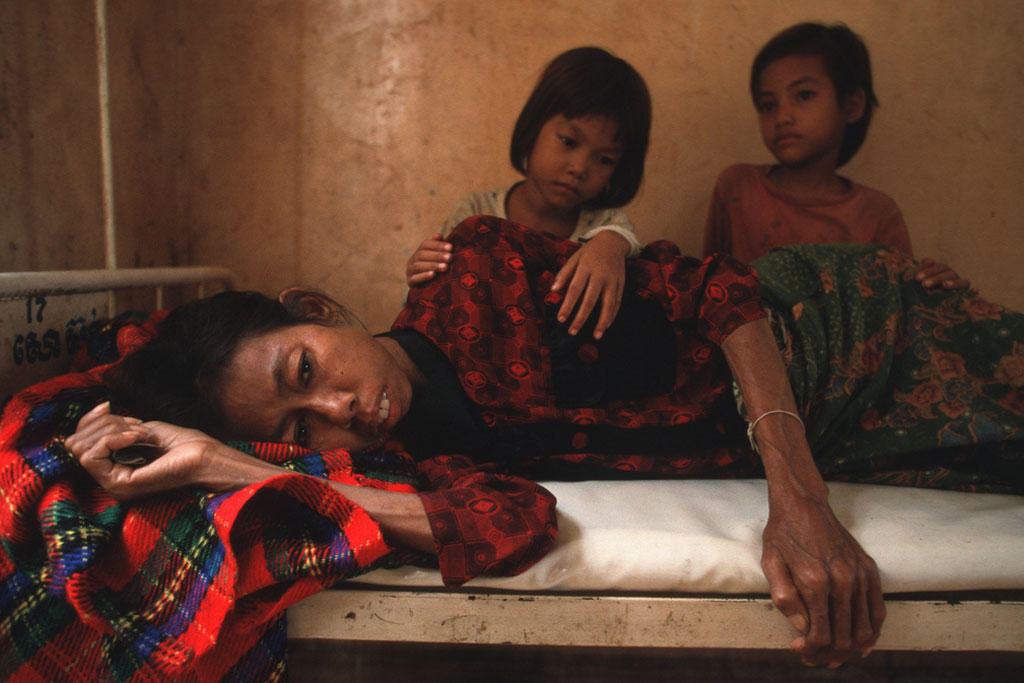
UN hails landmark pricing deal for faster roll-out of ‘game-changing’ HIV treatmentAgreement expected to accelerate treatment roll-out as part of global efforts to reach 36.7 million people living with HIV
Image: Two daughters look at their mother who is dying from AIDS. Cambodia. 2002. Photo: © Masaru Goto / World Bank
Senior United Nations officials today welcomed a breakthrough pricing agreement by global partners to accelerate the availability in low- and middle-income countries of the first affordable, generic, single-pill HIV treatment regimen.
“What we are talking about today with this life-changing announcement is about the quality of medicine, is about equity, is about the dignity, is about access to medicine as a human right,” Michel Sidibé, Executive Director of the Joint UN Programme on HIV/AIDS (UNAIDS), told a press conference at UN Headquarters.
The pricing agreement, he explained, will help ensure that the treatment will be made available to 92 countries, and people there will be able to benefit from “one of the best medicines we have” for first-line treatment.
At around $75 per person per year, the HIV treatment regimen containing dolutegravir (DTG) will be available to public-sector purchasers in these countries.
The agreement is expected to accelerate treatment rollout as part of global efforts to reach all 36.7 million people living with HIV with high-quality antiretroviral therapy. UNAIDS estimates that in 2016, 19.5 million – or just over half of all people living with HIV – had access to the life-saving medicines.
DTG, a best-in-class integrase inhibitor, is widely used in high-income countries and is recommended by the World Health Organization (WHO) as an alternative first-line HIV regimen. It is also a preferred treatment by the United States Department of Health and Human Services Panel on Antiretroviral Guidelines for Adults and Adolescents, among others.
WHO Director-General Tedros Adhanom also welcomed the agreement, stating that “this will save lives for the most vulnerable, bringing the world closer to the elimination of HIV […] WHO will support countries in the safe introduction and a swift transition to this game-changing new treatment.”
The agreement was announced by the Governments of South Africa and Kenya, together with UNAIDS and many other partners.
Earlier today, during an event entitled “Fast-Track: Quickening the pace of action to end AIDS” held on the sidelines of the General Assembly, Mr Sidibé called on world leaders to maintain “global solidarity” to end AIDS.
UNAIDS leads global efforts to achieve its shared vision of zero new HIV infections, zero discrimination and zero AIDS-related deaths.
WHAT IS PANCAP?
PANCAP is a Caribbean regional partnership of governments, regional civil society organisations, regional institutions and organisations, bilateral and multilateral agencies and contributing donor partners established on 14 February 2001. PANCAP provides a structured and unified approach to the Caribbean’s response to the HIV epidemic, and coordinates the response through the Caribbean Regional Strategic Framework on HIV and AIDS to maximise efficient use of resources and increase impact, mobilise resources and build the capacity of partners.
What are the Global AIDS Strategy 2021–2026 targets and commitments?
If targets and commitments in the strategy are achieved:
- The number of people who newly acquire HIV will decrease from 1.7 million in 2019 to less than 370 000 by 2025
- The number of people dying from AIDS-related illnesses will decrease from 690 000 in 2019 to less than 250 000 in 2025.
- The goal of eliminating new HIV infections among children will see the number of new HIV infections drop from 150,000 in 2019 to less than 22,000 in 2025.
What are the 95-95-95 Targets for ending AIDS?
- 95% of People Living with HIV know their HIV status;
- 95% of people who know their status on treatment; and
- 95% of people on treatment with suppressed viral loads.
HELPFUL LINKS:
Global AIDS Strategy 2021–2026, End Inequalities, End AIDS
https://pancap.org/pancap-documents/global-aids-strategy-2021-2026-end-inequalities-end-aids/
Caribbean Regional Strategic Framework on HIV and AIDS (CRSF) 2019-2025
https://pancap.org/pancap-documents/caribbean-regional-strategic-framework-2019-2025/
